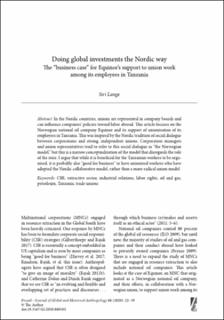Doing global investments the Nordic way. The "business case" for Equinor’s support to union work among its employees in Tanzania
Journal article, Peer reviewed
Published version

Åpne
Permanent lenke
https://hdl.handle.net/11250/2753927Utgivelsesdato
2020Metadata
Vis full innførselSamlinger
Originalversjon
Focaal: Journal of Global and Historical Anthropology. 2020, 88: 22–39 https://doi.org/10.3167/fcl.2020.880102Sammendrag
In the Nordic countries, unions are represented in company boards and can infl uence companies’ policies toward labor abroad. Th is article focuses on the Norwegian national oil company Equinor and its support of unionization of its employees in Tanzania. Th is was inspired by the Nordic tradition of social dialogue between corporations and strong, independent unions. Corporation managers and union representatives tend to refer to this social dialogue as “the Norwegian model,” but this is a narrow conceptualization of the model that disregards the role of the state. I argue that while it is benefi cial for the Tanzanian workers to be organized, it is probably also “good for business” to have unionized workers who have adopted the Nordic collaborative model, rather than a more radical union model.
